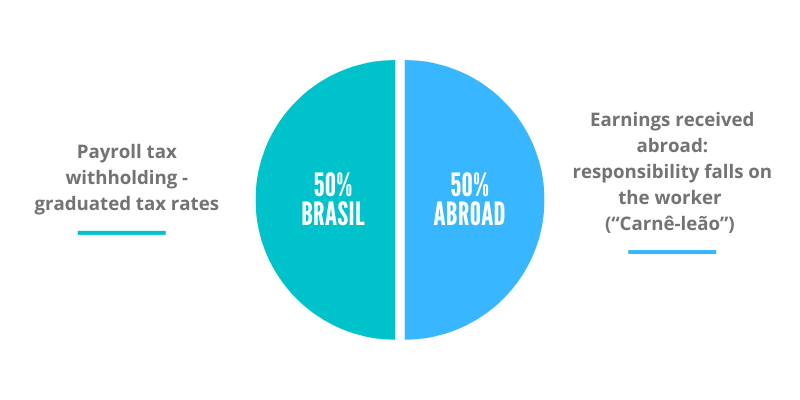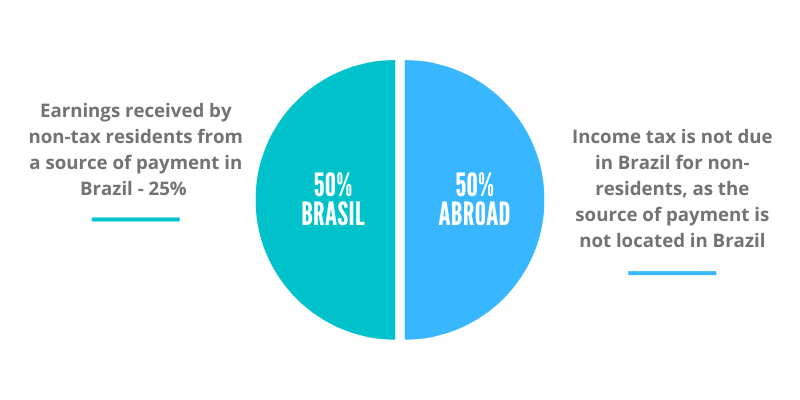
Income Tax: Federal Revenue Service will refund amounts collected on family support
17/10/2022Changes for accessing the eSocial Web Modules and the Domestic Employer app go into effect in December
20/10/2022EXPERT OPINION
Brazilians transferred abroad: get to know the taxation system and the expatriates’ tax obligations
Those who are planning to leave Brazil to move abroad can reduce costs and tax risks thanks to a solid tax planning
By Augusto Andrade
Brazilians who are transferred to work abroad are usually granted with a great career opportunity. But expatriates undergoing relocation must be mindful of their tax obligations in Brazil. After all, what happens to their taxable income after relocating to work abroad?
The first aspect to keep in mind is that professionals are better off if they perform a tax planning to prepare for the process, as this helps reduce costs and tax risks during the time spent overseas.
Studies should be carried out taking into account the regulations and treaties signed between the countries involved in the expatriation as well as the specifics of the transferred individual, such as the source of payment, assets held and investments owned, in addition to the employee’s own goals, of course.
A sound practice for multinationals is to provide this sort of guidance for employees who are about to be transferred. By doing this, employees will be more satisfied with the whole process, thus improving their experience and boosting their work performance.

Read more:
- Expatriate management: planning minimizes risks and cuts costs for companies and foreigners in Brazil
- Brazilians abroad: companies must be mindful of legal requirements
Tax residence: an important decision for expatriates
One of the first decisions relocating workers should take is whether or not to maintain their tax residence in Brazil. This is a very personal choice, one which is only up to the individual, but it highly affects the taxation outcomes.
Opting for tax residence means that all earnings of the individual will be taxed on a worldwide basis. Non-residents, on the other hand, are taxed according to the territorial principle of public international law, hence only earnings received from paying sources in Brazil will be subject to taxation.
Expatriates should weigh in the pros and cons for each option before choosing the one that best suits them.
Split payroll: how are expatriates taxed?
Split payroll is a paying method that divides an employee’s compensation to be paid partially in Brazil and partially abroad, using the currencies of the corresponding countries. Employee and employer may agree to split the former’s payroll in any percentage. Below is an example in which a worker is paid 50% in Brazil and 50% abroad.
At any rate, earnings are still affected by the employee’s tax residence:
Split payroll for tax residents
Whenever Brazilians relocated abroad opt to have their tax residence in Brazil, amounts paid in their home-country are subject to payroll tax withholding, as per the same rules in place for other employees working in Brazil.
As for earning received from employers abroad, those are subject to taxation in Brazil in the form of monthly income tax payments known as the "carnê-leão", and workers are responsible for paying the taxes themselves.

It is worth pointing out that amounts received abroad must be processed in the payroll for the collection of social security contributions – Brazilian Social-Security Institute (INSS) and Government Severance Indemnity Fund for Employees (FGTS).
Split payroll for non-tax residents
Whenever Brazilians relocated abroad have formally expressed their exit from the country, ending their tax residence in Brazil, but a portion of their compensation is still paid in Brazil, the corresponding earnings will be taxed at 25%.
But what about payments received abroad? These amounts will be exempt from Brazilian taxes because those workers are not considered tax-residents in Brazil anymore, thus the earnings they receive overseas are considered non-taxable income according to Brazilian law.

With regards to amounts paid in Brazil, taxes due by non-residents will always be subject to withholding, as established by law.
Expatriates’ tax obligations
Tax residents
- Pay the monthly income tax levied on earnings, including those received abroad (carnê-leão);
- File the annual Income Tax Return;
- File the Statement of Brazilian Capitals Abroad to the Central Bank (when applicable).
Non-tax residents
- Perform the process for termination of tax resident status upon leaving the country;<
- Appoint an attorney-in-fact with tax residence in Brazil to act on the employee’s behalf before the tax authorities;
- Supply the sources of payment in Brazil with information about tax resident/non-resident status.
It is worth mentioning that non-tax residents must refrain from having a bank account with investments in Brazil. Otherwise, they run the risk of being audited, due to the fact the Federal Revenue Service cross-checks information provided by financial institutions.
International treaties
International treaties define the tax residence location of an individual in order to determine how each type of income will be taxed. Treaties share similarities with one another, but specifics may vary, thus requiring careful reading and case-by-case evaluation.
It is important to carry out this analysis during the planning stages of expatriation. By doing this, workers may avoid double taxation.
Social Security Agreements
Brazil has signed several international agreements on social security. These agreements are very important for the following reasons:
- Individuals may pay their social security contributions only in Brazil, while also being eligible for social benefits in their destination country (within the terms of the agreement in effect); or
- The period of contribution in the destination country may be added to the time accrued in Brazil for retirement purposes – by summing up both periods.
Consulting services for expatriates and companies
Expatriate consultancy for companies and employees are among DPC’s core specialties. Count on our support to design the whole process and to perform the tax planning, as we take into account the particularities of each relocation and the unique needs of each client. Contact us: dpc@dpc.com.br.

Author: Augusto Andrade, partner at Domingues e Pinho Contadores.
How DPC may help your company?
Domingues e Pinho Contadores has specialized team ready to assist your company.
Contact us by the e-mail dpc@dpc.com.br
See more
Sign up for our Newsletter:
Are you interested?
Please contact us, so we can understand your demand and offer the best solution for you and your company.

Rio de Janeiro
Av. Rio Branco 311, 4º e 10º andar - Centro
CEP 20040-903 | Tel: +55 (21) 3231-3700
São Paulo
Rua do Paraíso 45, 4º andar - Paraíso
CEP 04103-000 | Tel: +55 (11) 3330-3330
Macaé
Rua Teixeira de Gouveia 989, sala 302 - Centro
CEP 27910-110 | Tel: +55 (22) 2773-3318






